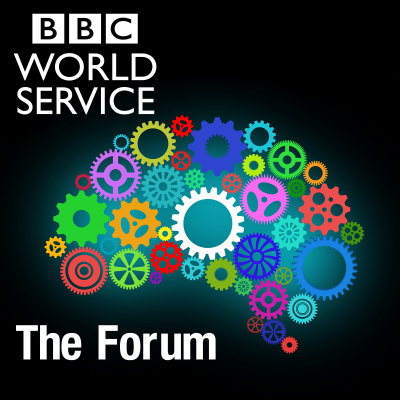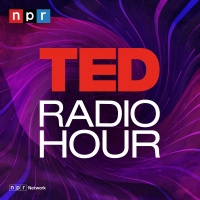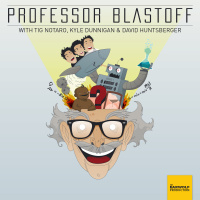Sinopse
A world of ideas
Episódios
-
Supermarkets
17/02/2024 Duração: 48minSupermarkets: they are ubiquitous yet hard to define, lauded and vilified in roughly equal measures, and in many countries they have a huge influence on what we eat. Technological innovations, big social changes and new shopping habits have all shaped their development and today’s megastores are a far cry from their small-scale ancestors of the 1930s. And yet, some quirks of supermarket design remain constant: for instance, why are the eggs always so hard to locate in the stores?Iszi Lawrence navigates supermarket aisles with the help of historian and economist Marc Levinson; Aarti Krishnan, Lecturer in Sustainability at Manchester University; Simona Botti, professor of marketing at London Business School and Forum listeners from around the world.(Photo: A customer in a supermarket. Credit: Adene Sanchez/ Getty Images)
-
Diplomacy
20/01/2024 Duração: 48minIn the 1990s, an advert for a brand of chocolate depicted a sophisticated gathering hosted by the foreign ambassador of an unspecified country. It hinted at a gilded existence of cocktail parties and small talk among influential, wealthy guests. Iszi Lawrence finds out how the stereotype of the diplomatic world compares with the reality of international relations. Who does the real work behind the scenes and who has the power? When we see powerful leaders on the world stage shaking hands and signing treaties, what has led up to that moment?Iszi discusses first hand experiences of the diplomatic world with the American diplomat Maryum Saifee and the former High Commissioner of Maldives to the UK, Farah Faizal. They are joined by Dr. Lorena de Vita, a historian of diplomatic relations to explain how their work impacts all of us. Plus World Service listeners from across the globe share their thoughts on what diplomats actually do. Produced by Fiona Clampin for the BBC World Service.
-
The story of throwaway living
16/12/2023 Duração: 48minThe humble plastic bag is actually a marvel of engineering: it is cheap, light, strong, waterproof and it has conquered the world. In countries where plastic bags have been banned, they are still being smuggled in. The environmental pollution and other problems that discarded plastic can cause has made it a focus of passionate debate. But is plastic really the problem or is it our increasing use of disposable and single-use items? The popularity of disposable products predates the invention of the plastic bag in the 1960s or even the advent of Western consumer society in the aftermath of the Second World War. And in the last three decades, so many new single-use items have been produced that we increasingly cannot imagine our lives without them, and not just in the festive season. So what is the way forward?Iszi Lawrence talks about all manner of disposable and single-use objects with Jennifer Argo, Professor of Marketing at the School of Business, Alberta University; Mark Miodownik, Professor of Material
-
Political parties and us
18/11/2023 Duração: 48minPolitical parties come in all shapes and sizes and their ideas are just as varied. But what kind of parties best reflect 21st-century society? How do we, as voters, choose between them at elections? What are their ever-increasing expenses spent on? And - perhaps most importantly - how well do political parties respond to the needs and views of the public?Iszi Lawrence discusses these questions with Professor Leonie Huddy from Stony Brook University who studies the psychology of politics, Associate Professor Karina Kosiara-Pedersen who researches party membership at the University of Copenhagen, Professor Paula Muñoz Chirinos who works on political finance at the University of the Pacific in Peru, Catherine Mayer co-founder of the Women's Equality Party in the UK, as well as student Luke Louis Ow from Singapore and other listeners from around the globe.(Photo: A sign in Dublin directing voters where to go in 2021. Credit: Artur Widak/Getty Images)
-
What makes a good boss?
21/10/2023 Duração: 48minWe can probably all think of examples of bad bosses – the people who we love to gossip about with our colleagues outside work. And even if you’re lucky enough to have had good experiences of management, you may be familiar with bad bosses from popular culture. But what makes a good manager and how can you inspire people in the workplace? It’s a question that’s been debated since the Industrial Revolution when rapidly expanding companies needed a way of controlling their workers. From there developed various theories of management, some of which drew on aspects of sociology and psychology.Rajan Datar is joined by Ann Francke, the chief executive of the Chartered Management Institute in the UK; Monica Musonda, the CEO of Java Foods in Zambia; and Todd Bridgman, Professor of Management Studies and Head of the School of Management at Victoria University of Wellington / Te Herenga Waka in New Zealand. We’ll also present a selection of comments and experiences sent in by Forum listeners.Produced by Fiona Clampin(
-
The joy and sorrow of roads
16/09/2023 Duração: 48minWhether we are pedestrians, cyclists or drivers, roads play a crucial role in our everyday lives. But where and how should we build any new ones? What kind of roads do we need? And how did we end up with the ones we have? Rajan Datar talks about the past and present of roads and roadbuilding with anthropologist Traci Ardren from the University of Miami, civil engineer Kate Castle, historians Alexis DeGreiff from the National University of Colombia in Bogota and Aparajita Mukhopadhyay from Kent University, literary scholar Stephanie Ponsavady from Wesleyan University in Connecticut and journalist Karim Waheed from Dhaka. Plus World Service listeners from around the globe share their road-trip joys and frustrations.(Photo: Road construction, worker with a shovel. Credit: blyjak/Getty Images)
-
Pets and us
19/08/2023 Duração: 48minFor every young American under the age of 18, there are about two cats or dogs receiving free food and lodgings in US homes and that pattern is replicated in many other countries. So why do so many of us keep pets? Why do we name them, consider them part of the family? Companionship, pleasure, status symbol and kinship with all life have been offered as explanations but it's easy to forget that mass keeping of pets - as opposed to working animals - is a recent development of the last two centuries or so. Iszi Lawrence talks about our evolving relationship with pets with Dr. Anindita Bhadra from the Dog Lab at the Indian Institutes of Science Education and Research in Kolkata; Dr. Erin Hecht, evolutionary biologist from Harvard; Dr. Margo DeMello, anthrozoologist from Carroll College in Montana; writer and cultural commentator from Japan Manami Okazaki; Durham University historian Professor Julie-Marie Strange; and Rachel Williams, neuroscientist at UCL and comedian. We also sift through the dozens of comment
-
The evolution of teenagers
15/07/2023 Duração: 49minIn some ways the 21st century is a very unusual time when it comes to adolescence - a study in the US found that teenagers smoke less, drink less and have less sex than the previous generation. And worldwide young people are coming of age in a digital era, with the dangers and opportunities that represents. Our expectations of teenagers vary hugely depending on the social, historical and cultural context. Paleoanthropologist Ella Al-Shamahi takes us through the big evolutionary questions about adolescence: Why do humans go through this developmental stage? What's the point of all that teenage angst? And how come every generation stubbornly repeats the same mistakes?She is joined by a panel of experts:Laurence Steinberg is one of the world's leading experts on adolescence. He is Professor of Psychology and Neuroscience at Temple University in Philadelphia, USA. His latest book is called, 'You and Your Adult Child'.Emily Emmott is a lecturer in biological anthropology at University College London. She's current
-
Global mass tourism
17/06/2023 Duração: 49minFrom Bhutan to The Bahamas and Iceland to Indonesia, mass tourism has grown at an unprecedented rate over the last few decades. Today’s top destinations are struggling with the sheer numbers of visitors and the United Nations has called for a total rethink on how the industry operates. The origins of travel for pleasure go back centuries and package holidays in the 1960s made it accessible to many in the West but it’s only the combination of cheap flights and the advent of the internet that has led to truly global tourism on a mass scale. Whilst the industry now generates huge income for many companies and individuals around the globe, critics point to the cost to both the environment and humankind. Drawing on listeners’ questions and comments, Rajan Datar examines the way mass tourism has impacted people’s lives, both positively and negatively, and asks if the enforced pause in tourism caused by Covid was utilised as an opportunity for a re-think. He is joined by Sihle Khumalo, a popular South African trav
-
A deep dive into deepfakes
20/05/2023 Duração: 49minAre we in a new age of information warfare? The technology to create deepfakes has progressed steadily over the past decade and enables anyone to create videos of people saying and doing things they didn’t actually say or do. But the idea of manipulating video to spread misinformation is almost as old as film itself. Presenter Iszi Lawrence invites a panel of experts to tackle your questions about AI technology and the uses of deepfakes. Is this something we should be concerned or excited about? What can be done to detect and block malicious content? And what does this mean for our understanding of truth and reality?Iszi is joined by Francesca Panetta, Director of the AKO Storytelling Institute at the University of the Arts, London; Joshua Glick, Visiting Associate Professor of Film and Electronic Arts at Bard College, NY and Samantha Cole, senior Editor at Motherboard/Vice and author of 'How Sex Changed the Internet'. We also hear from artist and technologist Halsey Burgund and from listeners Brandy and Ahma
-
How the mobile phone changed everything
15/04/2023 Duração: 48minWhen telecoms engineer Martin Cooper first chatted in public on a mobile phone 50 years ago few would have predicted that this brief telephone call would be the start of a revolution that would change the lives of billions. Over the last half a century, the mobile has transformed not just how we communicate with each other but also how we view and interact with the world around us. However, recent research suggests that this may not all be for the best.Drawing on listeners comments and questions, Rajan Datar explores what sets the mobile phone apart from previous communication devices. Why did SMS messaging take off so quickly after a slow start in the 1990s? And how did the morphing of a portable phone into a pocket computer a decade later lead to a situation where many people now interact with their phone more than with any human? Rajan is joined by Scott Campbell, Professor of Telecommunications at the University of Michigan whose work focuses on meanings, uses and consequences of mobile communication in
-
The submarine: Stealth machine
13/04/2023 Duração: 39minGiven the submarine's importance to many of the world's navies, it's perhaps surprising to learn that for many years it was considered an inventor's folly and of little use in maritime warfare. Indeed the submarine had a difficult birth because of the technical challenges involved in putting a moving vessel underwater, challenges that could only be overcome once the technology became available.The submarine eventually proved its potential in World War I, where its ability to pass undetected ushered in a new era of ‘unrestricted warfare’. Since then, it has never looked back and today’s submarines are capable of remaining submerged for months at a time – the ultimate stealth weapon. As navies modernise, what has traditionally been an exclusively male service is now opening up to women in some countries.Rajan Datar prowls the ocean's depths to find out more about the 'silent service', along with submarine designer Professor David Andrews from the Mechanical Engineering department of University College London
-
Hazel Scott: Jazz star and barrier breaker
06/04/2023 Duração: 41minA child prodigy on the piano, then a glamorous jazz and popular music entertainer, a civil rights campaigner and the first black American woman to host her own TV show: for the first three decades of her life, Hazel Scott’s rise to fame was vertiginous.Born in Trinidad in 1920, Scott was the headliner in some of New York’s most fashionable clubs by the time she was twenty. A couple of years later she became one of Hollywood’s highest paid entertainers and then married one of the most high-profile US Congressmen of her day. Their celebrity lifestyle regularly featured on newspaper front pages, Scott’s records were selling well and her syndicated TV show was given double airtime because it was so popular. And then, almost overnight, she vanished from public view. What happened? That's one of the questions Rajan Datar discusses with Scott's biographer and actor Karen Chilton; Loren Schoenberg, saxophonist, bandleader and Senior Scholar of the National Jazz Museum in Harlem; and playwright, lyricist and broadcast
-
The bittersweet tale of cocoa
30/03/2023 Duração: 39minDo you like cocoa? You are in good company: in South and Central America people have been enjoying the fruit of the cacao tree - the source of cocoa, chocolate and much else - for thousands of years. Ancient empires fought battles for the control of the best trees, cacao beans were used as currency, and being able to make a tasty cacao drink could even save your life. To trace the history of cacao in Latin America, Bridget Kendall is joined by archaeologist Cameron McNeil, chef and food historian Maricel Presilla and geneticist and cacao researcher Juan Carlos Motamayor. The reader is Joseph Balderama.(Photo: A cropped cocoa pod lies over dried cacao beans. Credit: Getty Images)
-
The dam builders
23/03/2023 Duração: 39minThe Hoover Dam in the US, the Aswan Dam in Egypt and the recently opened, and sumptuously named, Grand Ethiopian Renaissance dam. Since modern times, huge mega dams like these to tame rivers, create water storage and hydropower, have become a symbol of nationhood used to create national pride and bolster political power, from the Cold War to today. Nehru, the first Prime Minister of India, called dams the temples of modern India. But dams have also been highly controversial, displacing rural populations, disrupting local ecology and more recently it’s been shown that dams can increase the amount of greenhouse gases in the earth’s atmosphere. So why are so many countries like China still highly involved in dam building, and will they need to change tack in the future? And, could the humble beaver offer a solution?To discuss the past, present, and future of dam building, Rajan Datar is joined by Nikita Sud, Professor of the Politics of Development at Oxford University; Donald C. Jackson the Cornelia F. Hugel Pr
-
Alexander the Great or not so great?
16/03/2023 Duração: 39minFrom Persia to India to Greece – they called him The Great – that is Alexander the Great. Also known as Alexander III of Macedon, he was one of the most successful military leaders of all time. Undefeated by the time of his death in 323 BCE, he is still a go-to figure when people want to define an empire builder. But how should we view this often cruel and destructive militarist today in the light of current world events? And, despite his brutality, like his ransacking of the beautiful capital city of Persepolis, is there a more progressive side to Alexander, his desire for cultural assimilation for instance, that explains why he became an inspiration not just to nationalists and imperialists but also to writers, poets, and the gay community?To discuss the relevance of Alexander the Great today, Rana Mitter is joined by James Romm, Professor of Classics at Bard College in New York state whose latest book is Demetrius: Sacker of Cities, the failed but would-be successor to Alexander the Great; Dr Haila Mantegh
-
Rituals: Our anchors in a changing world
09/03/2023 Duração: 48minFrom coronations to cup finals, many of us love a big event, a ceremony with age-old observances. Indeed rituals, whether public spectaculars or more personal ones, such as a particular daily routine, have been part of human experience since time began. But why do rituals persist even though so many of them seem to serve no obvious practical purpose? Rajan Datar looks for clues in our past with the help of Egyptologist Dr. Elizabeth Frood and historian of Venice Prof. Edward Muir. It turns out that non-human animals – for instance elephants - also display ritual-like behaviour and not always for practical reasons. We hear from a leading behavioural ecologist, Dr. Caitlin O’Connell-Rodwell. We examine whether rituals really do remain unchanging through time: it might seem to be their essential characteristic but in reality they continuously evolve. And what about the power of contemporary collective ceremonies and the strong emotions that swell inside us from being part of a huge crowd? Anthropologist Dr. Dim
-
Tropicália: the movement that defied Brazil’s dictatorship
02/03/2023 Duração: 42minDrawing on traditional music, pop culture, kitsch, rock and modernist poetry to mention just a few of their sources of inspiration, the short-lived Tropicália movement in late 1960s Brazil was provocative and anti-authoritarian. Perhaps most importantly it represented a uniquely Brazilian aesthetic that could only have emerged from that country’s specific culture and history.The movement’s leading lights were eventually arrested by the military regime that governed Brazil at the time, and exiled to London. But Tropicália paved the way for other performers to demand artistic freedom.With the help of musical examples, Rajan Datar and guests will explore what made Tropicália so disruptive. Joining Rajan will be singer Mônica Vasçoncelos and guitarist Gui Tavares, social scientist Professor Liv Sovik from the Federal University of Rio de Janeiro, who’s published widely on Tropicália, including a collection of essays entitled Tropicália Rex: Popular music and Brazilian culture; and David Treece, Emeritus prof
-
How the shipping container changed the world
23/02/2023 Duração: 39minNearly everything we consume is transported by ship. The biggest container ships in the world are among the largest moving structures made by man and can carry over 24,000 20-foot container units. The standardisation of these simple metal containers in the 1950s and 60s marked a turning point in world trade, driving down costs and ultimately fuelling globalisation. Now that supply chains have become ever more complex and been put under increasing strain, we take a look at the history of the shipping container.Joining Rajan Datar are Marc Levinson, American historian and economist and author of The Box: How the Shipping Container Made the World Smaller and the World Economy Bigger; Alan McKinnon, professor of Logistics at Kühne Logistics University in Hamburg and author of Decarbonising Logistics: Distributing Goods in a Low Carbon World; Yash Gupta, shipping industry expert with over 20 years’ experience in vessel management and logistics. Presenter: Rajan Datar Producer: Jo Impey for BBC World Service(Photo:
-
Neanderthals: Meet the relatives
16/02/2023 Duração: 39minDevelopments in new technology such as DNA sequencing have transformed our understanding of the Neanderthals, one of a group of archaic humans who occupied Europe, the Middle East and Western Asia more than 300,000 years ago.First identified by fossil remains in 1856 in a German quarry, the Neanderthals led an extremely physical existence as hunter-gatherers. They were stronger than us, adaptable as a species to huge variations in climate, with brains as large as ours and sophisticated ways of creating tools.Many of us carry some of the DNA of Neanderthals, thanks to interbreeding with homo sapiens. Although the Neanderthals today are no longer with us, their story has a lot to tell us about ourselves and our future survival on the planet. Rajan Datar is joined by Janet Kelso, a computational biologist and Group Leader of the Minerva Research Group for Bioinformatics at the Max Planck Institute for Evolutionary Anthropology. She specialises in the analysis of DNA sequencing of ancient people such as Neande









